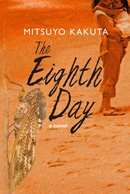
On February 3, 1985, Kiwako makes her way into the home of her married ex-lover, and leaves with his newborn child tucked underneath her coat. With Kaoru in her arms, she flees Tokyo to start a journey with the child she should have had, had she not been persuaded to have an abortion.
Ingenious in its narration, The Eighth Day is told from two points of view: that of Kiwako and that of Kaoru, known only by newspapers as "the girl raised by a kidnapper".
Kiwako's journey is engaging and heart-wrenching as we know it can only lead to one thing: capture. Till then, she starts a series of encounters with women who have all had a dramatic experience involving motherhood. She spends a few days with a friend who understands the toils of having a newborn, has a brief stay in the home of a woman facing eviction and forms a strong tie with a young girl whose child was also taken away unwillingly. Her travels then lead her to the Angel Home, a known sect that accepts only women and is slowly cooking up controversy. When faced with the threat of a police raid, Kiwako is forced to flee again, and she finds an island where she can finally settle and start her life as a single mother. That is, until she is caught on camera in a local paper and Kaoru is taken away.
The latter half of the story is told from Kaoru's point of view, now a 20-year old student named Erina, as she copes with the idea of having been a "stolen baby". Having struggled to tear herself away from the newspapers' depictions of her life, she is forced to relive the memories she has pushed away when she encounters a girl who also once resided in the Angel Home. Under the pretense of research, she relates her struggles with her biological parents and her "adoptive" mother, as well as her adamant repulsion and anger towards her situation. Ironically, Erina now finds herself in the same position as Kiwako once was: pregnant by a married man. It is now up to her to decide her baby's future as she finds herself reliving her "adoptive" mother's footsteps.
With the topic of motherhood at the forefront of this story, we find ourselves relating to a kidnapper, as Kiwako struggles to keep Kaoru while frantically evading the police. Her plight is motivated only by the love she has for the child and we find ourselves hoping that she gets away even though we know it's technically the wrong thing. And as we read through Erina's struggles we can only hope that destiny is what we make of it, not what it makes of us.
The Eighth Day is Mitsuyo Kakuta's second novel to be translated into English. I hope that the novel's amateur cover design doesn't
deter readers from delving into this gripping and touching story, for there are many wonders to be discovered. I look forward to
more translations, and more opportunities for a deeper glimpse Kakuta's work.

Kodansha International, hardcover, 9784770030887
